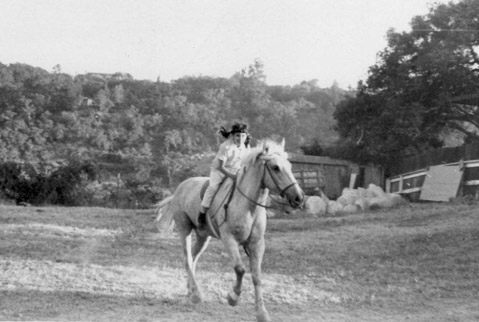From Stable to Table?
Neigh!

I like horses: I’m not a horsey guy, but some of my happiest times have been astride a guest-ranch steed plodding along in the great outdoors.
But I do not eat horses, at least not if I can help it. My daughter Wendy, who caught horse fever in her early teens, leading to my buying her a pony, would kill me.
After all, we live in California, where most people would be horrified at being served horse burgers or lasagna masquerading as beef. In fact, in California, it’s illegal to slaughter our hooved companions or sell their remains. Yet the French have long cherished a savory meal fashioned from the corpse of someone’s former pet, faithful beast of burden, too-slow racehorse.

Many consider horsemeat a delicacy and you may be surprised that it’s eaten in countries all over the world, not just in France. Leaner than beef, it is also considered tastier than cow corpse by some gourmets.
Little was said until now. But this month a scandal hit Europe, and at this writing, three British men have been arrested and charged with taking part in the great switcheroo, horsemeat instead of the beef listed on the label.
And, it turns out, a part-time Santa Barbaran is up to his fetlocks in the scandal. Not that multimillionaire-financier-rancher-polo-player-party-thrower-Montecito-mansion-owner Lyndon Lea is accused of knowing that one of his many companies was suspected to have sold horse flesh in the frozen lasagna. Do we really expect him to trudge through his factories tasting the output? Of course not.
But the 44-year-old Brit apparently does have ample time to throw parties at his $38.7-million mansion on Channel Drive, like the housewarming at which sushi was reportedly served on the bodies of half-naked women, while other women were clad only in discreetly applied body paint, at least according to British publications. I can’t verify that this actually occurred, as my invitation was apparently lost in the mail.
Along with the mansion, not far from Oprah’s digs and Ty Warner’s enclave on Channel Drive, Lea also purchased the El Capitan Ranch a few years ago, where his prize-winning polo team, Zacara, performs. No, not Bacara, that’s the nearby resort. Zacara is a combination of the names of his two children, Zachary and Chira.
Lea bought the 201 acres in 2010, according to a news item in The Santa Barbara Independent, from former Hollywood producer Jon Peters and his wife, Mindy, following a $2-million lawsuit involving Peters and a landscaper.
At last report, fingers are being pointed all over Europe: Who’s to blame for the tainted spaghetti Bolognese and, as Bloomberg Businessweek headlined, “The Irish Horse Meat Mystery,” in which Irish food-safety officials checking two frozen-meat vendors found that meat labeled beef actually contained 75-80 percent horsemeat.
Merchants in Britain, France, and Sweden promptly joined Ireland in pulling suspect products from their shelves. Bogus beef was also found in supermarkets in Switzerland and Germany.
The source of the food-chain mix-up is still in question. Romania is blamed by some. According to one Irish official, the paper trail also leads to Poland, always one of the usual suspects when problems crop up in Europe. (The Danes, during my travels in their land, joked that couples sharing bed and board without benefit of a marriage ceremony were “living in the Polish way.” Not that the casual Danes are that strict with convention. They say they often don’t bother with a preacher until the third child is born.) And Britain is charging those three meat-plant employees with fraud.
To make matters worse, horse carcasses sent to France tested positive for the anti-inflammatory drug bute, a horse medicine considered harmful to humans. But don’t worry, U.K.’s chief medical officer assured diners. At the levels of bute that have been found, “a person would have to eat 500-600 burgers a day that are 100-percent horse meat to get close to consuming a human’s daily dose,” announced Professor Dame Sally Davies.
Sure, but you don’t see the good professor proving it, do you?
In France, they call horsemeat viande chevaline, which looks better on the menu. “There’s a slight sweetness to it,” claims Curtiss Calleo, cofounder of the eating club Gastronauts, according to Bloomberg. “It has a rich taste.” In Japan, you can find horse sashimi. In Italy, it’s horse salami, of course.
Question: Would the Lone Ranger eat Silver?



